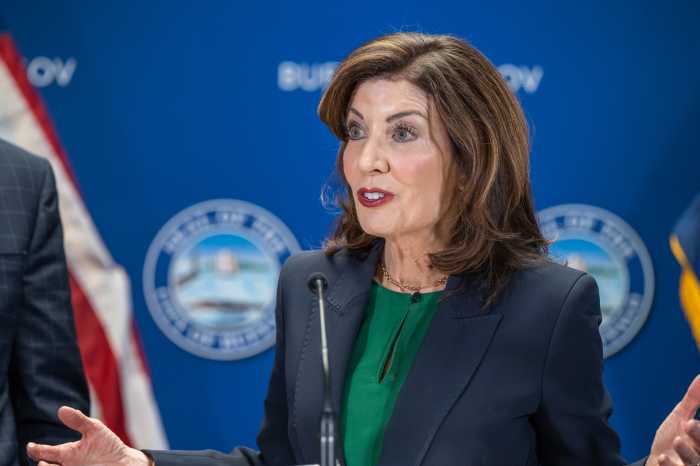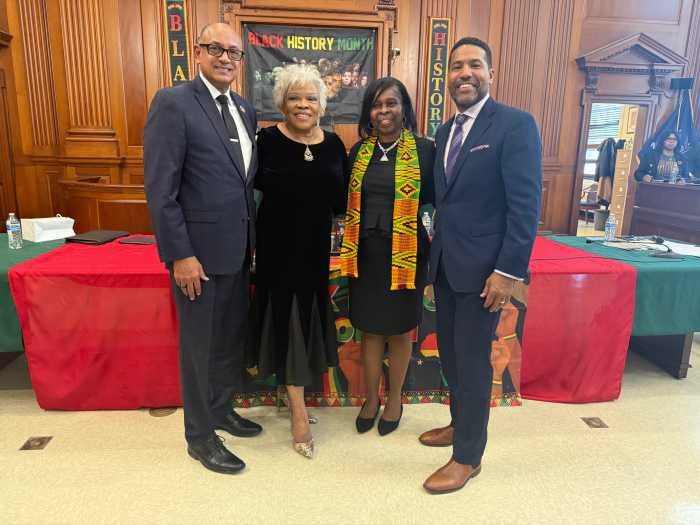ILLUSTRATION BY MICHAEL SHIREY
BY PAUL SCHINDLER | With the Supreme Court’s refusal, since last October, to block marriage equality rulings from federal appeals courts as well as some US district courts, 18 new states have been added to the roster of places same-sex couples can legally wed. Officials in several states were outspoken about their unhappiness and creative — if somewhat desperate — in their legal maneuvering to block the inevitable. Still, after some dilatory feints, gay marriage arrived in those states and resistance largely fell away.
Alabama could prove the exception. That, at least, is what Alabama Supreme Court Chief Justice Roy Moore has spent the last couple of weeks trying to make happen.
Advocates, for their part, are confident that whatever wrenches Moore throws into the works can be cleared away. “Temporary problems” created by Moore’s “anomalous extremism,” said Evan Wolfson, president of the national advocacy group Freedom to Marry, are “not to be confused” with any “real, authentic, and organic resistance” by Alabama residents.
The current fracas began with two rulings, on January 23 and 27, from Judge Callie V.S. Granade of the Southern District of Alabama, who found that the ban on same-sex marriage there violated the US Constitution. Granade gave the state until February 9 to seek a stay — to give it time to appeal — from either the 11th Circuit Court of Appeals or the US Supreme Court.
The high court’s willingness to allow marriage decisions to go into effect began when it announced it would not review pro-equality rulings out of the Fourth, Seventh, and 10th Circuits in early October. In late December, in a case involving a decision out of Florida, the Supreme Court, for the first time, let a district court marriage ruling take effect without review by a circuit court of appeals.
In that sense, the high court’s decision, on February 9, to refrain from staying Granade’s rulings in Alabama was not a big surprise — except that between its Florida decision in December and then, the court agreed to review the Sixth Circuit’s ruling against marriage equality, in cases from Ohio, Michigan, Tennessee, and Kentucky. The Supreme Court’s decision not to freeze Alabama’s status quo even while it actively engages the marriage equality question from the Sixth Circuit was the clearest sign yet of how the ultimate question will be settled later this year — a point not lost on Justice Clarence Thomas. In a frustrated dissent from the majority, on which he was joined by Antonin Scalia, Thomas wrote, “This acquiescence may well be seen as a signal of the Court’s intended resolution of that question…. In this case, the Court refuses even to grant a temporary stay when it will resolve the issue at hand in several months.”
Alabama Supreme Court Chief Justice Roy Moore. | ALABAMA SUPREME COURT
The Supreme Court’s denial of a stay to Alabama — which came the day Judge Granade’s order was due to take effect, less than an hour before the state’s probate courts, responsible for issuing marriage licenses, opened in Alabama’s 67 counties — would normally have allowed same-sex couples statewide to get licenses immediately.
Chief Justice Moore made sure that didn’t happen.
On the previous evening, February 8, Moore, acting in his role as “administrative head of the judicial system” in Alabama, issued an order to the county probate judges saying, “Effective immediately, no Probate Judge of the State of Alabama nor any agent or employee of any Alabama Probate Judge shall issue or recognize a marriage license that is inconsistent with” the State Constitution.
Provocation is nothing new for Moore. In 2003, he was thrown off the Alabama Supreme Court after defying a federal judge’s order that he remove a massive granite Ten Commandments display from the court’s lobby; his absence proved temporary, however, with voters returning him to the bench in 2012.
Moore began his drive to resist marriage equality in a January 27 letter to Republican Governor Robert Bentley, where he argued that the US Constitution gives Granade no authority to rule on marriage, which he termed a “divine institution.”
“I ask you to continue to uphold and support the Alabama Constitution with respect to marriage, both for the welfare of this state and for posterity,” Moore wrote to the governor. “Be advised that I stand with you to stop judicial tyranny and any unlawful opinions issued without constitutional authority.”
Moore’s intervention had predictable results: confusion, even some chaos. Surprisingly, however, roughly a third of the counties — representing some of the state’s biggest cities — were on board with Granade’s ruling within the first couple of days. Some counties stopped issuing marriage licenses of any kind, saying Moore’s order had muddied the waters. Other probate judges noted that the federal court ruling barred the Alabama attorney general and other agents of the state from enforcing the marriage ban but did not order them to issue licenses.
Soon enough, Granade addressed that issue in response to a motion from the four plaintiff couples who had prevailed on January 27. In a February 12 order, she enjoined the Mobile County probate judge “from refusing to issue marriage licenses” to them. Though the order did not specifically apply to other probates judges, the handwriting was on the wall. According to Randall Marshall, legal director at the American Civil Liberties Union of Alabama, no probate judge at that point could be under any illusion that their obligations were different than Mobile County’s.
And, indeed, the number of counties issuing marriage licenses to same-sex couples shot up — as of February 18, the number stands at 48 of 67, with two more signaling they are ready to go, according to the Human Rights Campaign.
The successful plaintiffs in the January 23 ruling, Cari Searcy and Kimberly McKeand, with their son K.S.
Even with this, however, the matter is not yet settled in Alabama. At least 10 counties continue to issue licenses only to different-sex couples, with the remainder having indefinitely shuttered their marriage license windows as they sort the matter out. On February 11, two anti-gay groups — the Alabama Policy Institute (API) and the Alabama Citizens Action Program (ALCAP) — filed a petition with the State Supreme Court asking it to order probate judges to stop issuing same-sex marriage licenses. These groups may have problems demonstrating their legal standing to petition the state high court on this issue since they lack a concrete stake in its resolution. That’s the issue that tripped up the defenders of California’s Proposition 8 at the US Supreme Court two years ago, though no exact parallel can be drawn between the rules governing appeals in the federal judiciary and practices in Alabama state courts. Still, it’s worth noting that the two justices on the Alabama court unwilling to consider the API/ ALCAP petition rejected it on grounds of standing.
Still, six justices — Moore absent from the court’s response for unknown reasons — were willing to consider the matter and ordered the probate judges named in the API/ ALCAP petition to file briefs by 5 p.m. on February 18.The petitioners, in turn, will have until the end of the day on February 20 to respond to those briefs.
What happens next is anyone’s guess.
“I’m sitting in Montgomery, Alabama, and asking the same question,” said the ACLU’s Marshall when asked how this could play out. The petition could be dismissed, he said, on a variety of procedural grounds, including standing, or it could be rejected on the merits. Or, of course, the state high court could move into an openly defiant posture by ordering the probate judges to stop complying with Granade’s ruling.
“It would be very disconcerting for a probate judge to receive an order from the State Supreme Court and disregard it,” Marshall said. Still, constitutional defiance is not the same as a “constitutional clash,” in his view.
“The question is clear as a matter of federal law,” Marshall said. “If the district court had all the probate judges before her, she could order them to issue licenses. She could order them not to comply” with any countervailing order from the Alabama Supreme Court. The Supremacy Clause in the US Constitution unambiguously settles the question, in Marshall’s view, even though he admitted the story would play out in the media as an epic confrontation over states’ rights.
For his part, Moore rejects Marshall’s view of the state of play. When pressed in national media interviews, the chief justice acknowledged that should the US Supreme Court rule favorably on marriage equality as now widely expected, “the state courts would be bound” by that. He is vociferous, however, in denying the authority of a federal district court to decide the question. In his view, state courts and the federal judiciary’s lower courts stand on par with each other, with the US Supreme Court the only bench that can resolve disputes.
For Freedom to Marry’s Wolfson, Moore’s argument is disingenuous: “There was no state case until he created one by going down a lawless path.” Moore was able to inject his “anomalous extremism” into the Alabama debate due to the “anomalous quirk” in state law that puts those issuing marriage licenses under the administrative authority of the chief justice and not the governor and the executive branch. Neither Alabama’s Republican governor nor its Republican attorney general, both of whom oppose marriage equality, Wolfson noted, has allied himself with Moore on his resistance to Granade’s authority.
Saying he was “reasonably hopeful that the Alabama Supreme Court will not drag out the delay invited by Roy Moore,” Wolfson acknowledged that should the State Supreme Court direct probate judges to defy the federal district court, confusion will get worse before it gets better.
The ACLU’s Marshall said, “We’re hoping that this does not create the kind of chaos this could create.”
But both Marshall and Wolfson, for now at least, see Moore’s shenanigans as a “side show.”
“Marriage equality is coming to Alabama, one way or the other,” Marshall said. “We will prevail.”






































